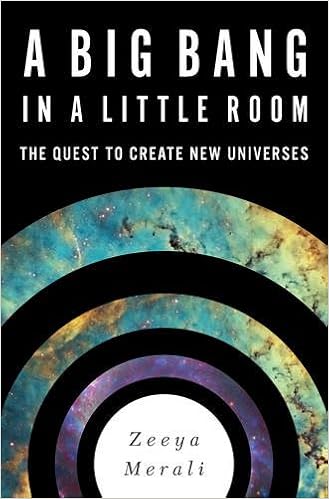 In “Physics: A cosmos in the lab,” a review of A Big Bang in a Little Room: The Quest to Create New Universes by Zeeya Merali, cosmologist Andreas Albrecht writes at Nature,
In “Physics: A cosmos in the lab,” a review of A Big Bang in a Little Room: The Quest to Create New Universes by Zeeya Merali, cosmologist Andreas Albrecht writes at Nature,
The question of cosmic origins, and the possibility that humans might create new universes, can connect with religious concerns. These form a substantial thread through A Big Bang in a Little Room that significantly reduced the book’s appeal to me. I am an atheist. I respect that many people are deeply religious (some are very close to me) and that religion can have a positive, even beautiful, role. And I know many religious people who do superb science. But I find most attempts to connect religious questions with the fundamental questions of physics and cosmology (or vice versa) deeply unsatisfying.
Does your favourite interpretation of quantum mechanics or apparent fine-tuning of the fundamental constants provide evidence for or against a divine creator? Deeply religious people know better than to leave something so important to them to fads in physics. And when people do engage in these debates, they seem to find a reason to believe what they want to believe, regardless of how the science unfolds.
More.
Rubbish. Fine-tuning is the most obvious fact of the universe and efforts to undermine the evidence for it have driven crackpot cosmology for decades. The crackpots now turn on the very idea of evidence to protect their position.
First, no one cares what Dr. Albrecht finds “deeply unsatisfying”; he can find himself another universe if he likes, and take his fads in physics with him.
Second, “deeply religious people” feel constrained by facts, evidence, and truthfulness, not by the view—attractive to so many Darwinian atheists—that “evolution” bred a sense of reality out of us.
The choice matters to science and we fear we know which one most of them have made.
By the way, why are atheists so solicitous about theists who, they fear, will lose their faith? The reality is that the only faith many of us are rapidly losing is in government of science by atheists. Take the unstoppable crises of peer review, for example.
Why are we better off with science’s affairs run by people who believe that if they win they survive and that none of us evolved so as to grasp reality anyway?
Note: We confess we don’t know why all this sounds like BioLogos on steroids either.
See also: Evolution bred a sense of reality out of us
Ethan Siegel tackles fine-tuning at Forbes
and
Copernicus, you are not going to believe who is using your name. Or how.